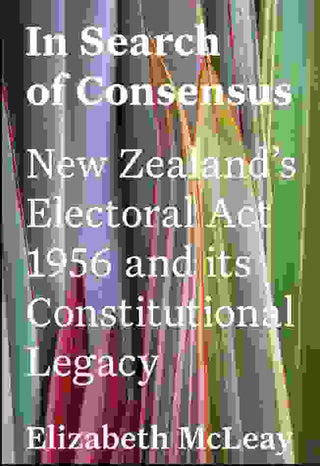In Search of Consensus : New Zealand-s Electoral Act 1956 and It-s Constitutional Legacy
- Unit price
- / per
-
Author:Elizabeth Mcleay
-
ISBN:9781776561841
-
Publication Date:March 2018
-
Edition:1
-
Pages:254
-
Binding:Paperback
-
Publisher:Te Herenga Waka University Press
-
Country of Publication:


A Back Order button means that we don’t have the book in stock at our store. It may already be on order – or we can order it for you from a publisher or distributor at no additional cost.
As we source items from around the globe, a back-order can take anywhere from 5 days to several weeks to arrive, depending on the title.
To check how long this might take, you’re welcome to contact us and we can provide an ETA or any other information you need. We recommend checking the timeframe before committing to an online order.
In Search of Consensus : New Zealand-s Electoral Act 1956 and It-s Constitutional Legacy
- Unit price
- / per
-
Author:Elizabeth Mcleay
-
ISBN:9781776561841
-
Publication Date:March 2018
-
Edition:1
-
Pages:254
-
Binding:Paperback
-
Publisher:Te Herenga Waka University Press
-
Country of Publication:
Description
In a series of backroom negotiations in 1956, the National Government and Labour Opposition agreed to put aside adversarial politics temporarily and entrench certain significant electoral rules. For any of these rules to be amended or repealed, Section 189 of the Electoral Act (now Section 268 of the 1993 Act) requires the approval of either three-quarters of all MPs or a majority of electors voting in a referendum. The MPs believed this entrenchment put in place a moral constraint to guide future parliaments but its status has changed over time.
In Search of Consensus tells the story of why and how such a remarkable political settlement happened. It traces and analyses the Acts protected provisions, subsequent fortunes and enduring legacy. As such, it is an important contribution to understanding the contemporary constitution and political culture of Aotearoa New Zealand.
Featured in the April 2018 Law Newsletter.
To receive this newsletter regularly please email us with your name and contact details.
Adding product to your cart
You may also like
A Back Order button means that we don’t have the book in stock at our store. It may already be on order – or we can order it for you from a publisher or distributor at no additional cost.
As we source items from around the globe, a back-order can take anywhere from 5 days to several weeks to arrive, depending on the title.
To check how long this might take, you’re welcome to contact us and we can provide an ETA or any other information you need. We recommend checking the timeframe before committing to an online order.
You may also like
You may also like
-
In a series of backroom negotiations in 1956, the National Government and Labour Opposition agreed to put aside adversarial politics temporarily and entrench certain significant electoral rules. For any of these rules to be amended or repealed, Section 189 of the Electoral Act (now Section 268 of the 1993 Act) requires the approval of either three-quarters of all MPs or a majority of electors voting in a referendum. The MPs believed this entrenchment put in place a moral constraint to guide future parliaments but its status has changed over time.
In Search of Consensus tells the story of why and how such a remarkable political settlement happened. It traces and analyses the Acts protected provisions, subsequent fortunes and enduring legacy. As such, it is an important contribution to understanding the contemporary constitution and political culture of Aotearoa New Zealand.Featured in the April 2018 Law Newsletter.
To receive this newsletter regularly please email us with your name and contact details. -
-
Author: Elizabeth McleayISBN: 9781776561841Publication Date: March 2018Edition: 1Pages: 254Binding: PaperbackPublisher: Te Herenga Waka University PressCountry of Publication:
In a series of backroom negotiations in 1956, the National Government and Labour Opposition agreed to put aside adversarial politics temporarily and entrench certain significant electoral rules. For any of these rules to be amended or repealed, Section 189 of the Electoral Act (now Section 268 of the 1993 Act) requires the approval of either three-quarters of all MPs or a majority of electors voting in a referendum. The MPs believed this entrenchment put in place a moral constraint to guide future parliaments but its status has changed over time.
In Search of Consensus tells the story of why and how such a remarkable political settlement happened. It traces and analyses the Acts protected provisions, subsequent fortunes and enduring legacy. As such, it is an important contribution to understanding the contemporary constitution and political culture of Aotearoa New Zealand.Featured in the April 2018 Law Newsletter.
To receive this newsletter regularly please email us with your name and contact details.-
Author: Elizabeth McleayISBN: 9781776561841Publication Date: March 2018Edition: 1Pages: 254Binding: PaperbackPublisher: Te Herenga Waka University PressCountry of Publication:
-



